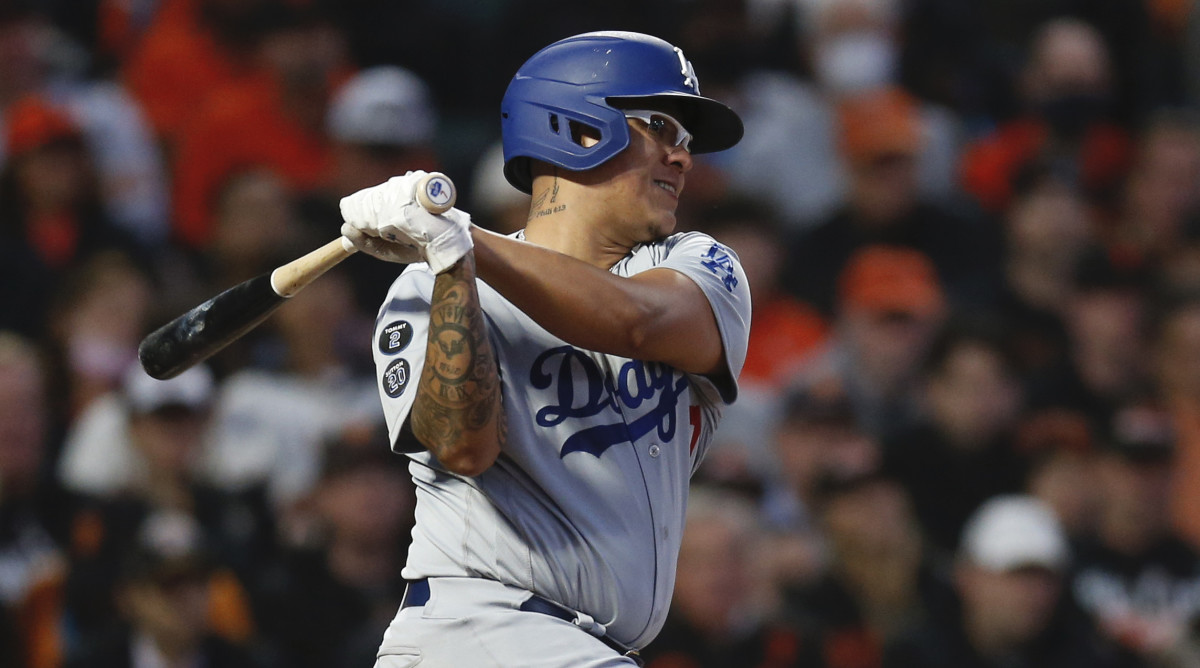Unlikely Offensive Heroes Help Dodgers Even Series

SAN FRANCISCO — On Friday night, Dodgers manager Dave Roberts issued his hitters a challenge: Shape up.
Los Angeles had just dropped the first game of the National League Division Series to the Giants in dispiriting fashion. The Dodgers saw just 103 pitches, their fewest in nine innings since 2015. They struck out 11 times and did not draw a walk. They looked utterly overmatched.
Roberts did not call a team meeting to address the feeble performance. But the cheerful man who generally projects optimism whether or not it is warranted took a seat for his postgame press conference and lit his team up.
“We just didn't make an adjustment all night long,” he said. “I thought we had the same club all night long and that was a driver.” He blamed “guys at the top and the bottom [of the batting order] that didn’t take good at bats tonight.” Asked if righty Logan Webb had done anything in particular to keep L.A. off balance, Roberts reiterated his frustration.
“No,” he said. “He had good command and there were some mistakes in there that we didn't hit. But, again, I think the bottom line, the story is that we swung at a lot of balls out of the strike zone tonight.”
The story on Saturday night was quite different. The Dodgers dispatched the Giants 9–2 in Game 2 to even the series and remind everyone—including their manager—that the team that won 106 games this season is not done just yet.

At first it seemed that Roberts might be disappointed again. Seven times in the first four frames L.A. hitter swung and missed at pitches outside the strike zone. They finally scored their first run of the series in the second inning, but only because pitcher Julio Urías felt slighted.
San Francisco intentionally walked No. 8 hitter AJ Pollock in order to face Urías with two on and two out—and Urías, he said, took that personally. “After they walked Pollock, you kind of want to do a little bit better,” Urías said through interpreter Juan Dorado. Kevin Gausman left a splitter in the zone, and Urías lofted it into short right field to score a run. The next batter, right fielder Mookie Betts, singled to left to drive in another run.
“It’s like Steph Curry, just seeing one go in,” said Betts. “We just needed to see one cross the plate.”
Sign up to get the Five-Tool Newsletter in your inbox every day during the MLB playoffs.
Still, Gausman then retired 10 straight before he began to falter in the sixth. With two on and one out, Giants manager Gabe Kapler summoned righty Dominic Leone to make his playoff debut. Leone walked center fielder Chris Taylor to load the bases.
Up came first baseman Cody Bellinger, the source of much of Roberts’s ire. Bellinger at times seems to believe the strike zone begins at the letters and ends somewhere below the Earth’s crust. In the seventh inning of Game 1, he swung through three changeups at his ankles. The manager has grown tired of hearing about the tweaks the player is making to his stroke.
“For me it's not even about the swing mechanics right now,” Roberts said before Game 2. “It's about approach and executing a plan and getting him in the zone. If we're going to swing at balls down below, it doesn't matter what kind of mechanics you have.”
On Saturday, Leone’s first pitch was 96 mph in the middle of the strike zone. Bellinger clobbered it 393 feet to left-center for a two-run double. Up came Pollock, whose postseason numbers—a .495 OPS in 80 plate appearances—actually made a compelling case for facing him rather than Urías.
Leone’s first pitch was a slider down and away. Pollock lined it to left for another two-run double. The Dodgers never looked back. Now they can look forward, to Game 3 in Los Angeles, when they counter the Giants’ Alex Wood with Max Scherzer, who had a 1.98 ERA in 11 starts after the team traded for him at the deadline.
After the game, Roberts, Bellinger and Pollock smiled as they discussed their improvements. Those two players had combined to go 0-for-9 with seven strikeouts before their doubles. Roberts said he was not sure what had changed. “I don’t know the answer,” he said. “I wish I knew it in about the third inning last night.”
Neither did the players. They could not identify any real adjustments they had made.
“We’re not trying to chase!” Bellinger said.
Perhaps Pollock got the closest. “When you put up nine runs, obviously everyone's gonna feel like your approach is good,” he said. “When you put up zero, no one's gonna like it.”
More MLB Coverage:
• Inside Kris Bryant's Journey From Chicago to San Francisco
• This Is What the Giants Do
• Why the Astros Are So Dangerous in the Postseason
• J.D. Martinez Provides Spark to Propel Red Sox in ALDS
